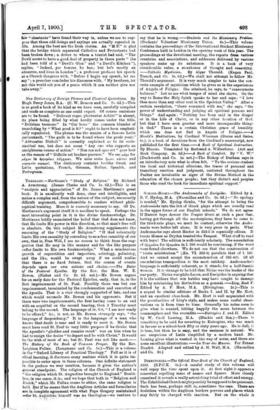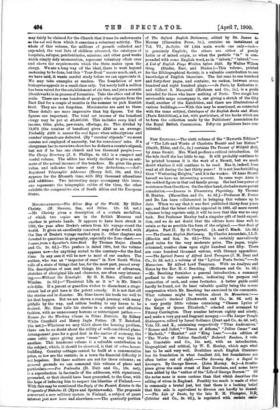DIRECTORIES.—The Official Year - Book of the Church of England, 1900. (S.P.C.K.
3s.)—A careful study of this volume will well repay the time spent upon it. At first sight it appears a somewhat repelling mass of names and figures. More closely examined it reveals a really astonishing total of effort and energy. The Established Church might possibly be supposed to be quiescent. Such has been, perhaps still is, sometimes the case. There are doubtless within the Anglican borders persons and places which may fairly be charged with inaction. But on the whole it may fairly be claimed for the Church that it uses its endowments as the r aria from which it exercises a voluntary activity. The whole of this volume, the millions of pounds collected and expended, the vast lista of children educated, the catalogue of hospitals, refuges, penitentiaries, missions, and other good works which simply defy enumeration, represent voluntary effort over and above the requirements which the State makes upon the clergy. We are a long way off the ideal, there is work beyond reckoning to be done, but this " Year-Book " means much, and, as we have said, it wants careful study before we can appreciate it. We may take examples at random. The foundation of new bishoprics appeals to a small class only. Yet nearly half a million has been raised for the establishment of six Sees, and yet a seventh (Southwark) is in process of formation. Take the other end of the scale. There are some hundreds of people who migrate from the East End for a couple of months in the summer to pick Kentish fruit. They are not forgotten. Missionaries are sent to them. These details are more impressive than big figures. Yet the figures are important. The total net income of the beneficed clergy may be put at 23,400,000. This includes every kind of income, tithe, glebe, pew-rents, offerings, &c. This divided by 13,973 (the number of benefices) gives -£243 as an average. Probably £200 is nearer the real figure when subscriptions and curates' stipends are deducted. (By " curates' stipends" we mean curates not employed of necessity, but for conscience' sake. If a clergyman has to serve two churches he deducts a curate's stipend, but not if he has one church and ten thousand people.)— The Clergy Directory (J. S. Phillips, 4s. 6d.) is a compact and useful volume. The editor has wisely declined to give an esti- mate of the actual incomes of the benefices. He gives the gross value, and indicates the nature of the deductions.—Sell's Registered Telegraphic Addresses (Henry Sell, 18s. and 218.) appears for the fifteenth time, with fifty thousand alterations and additions. Two interesting maps accompany this issue; one represents the telegraphic cables of the time, the other exhibits the comparative size of South Africa and the European States.







































 Previous page
Previous page